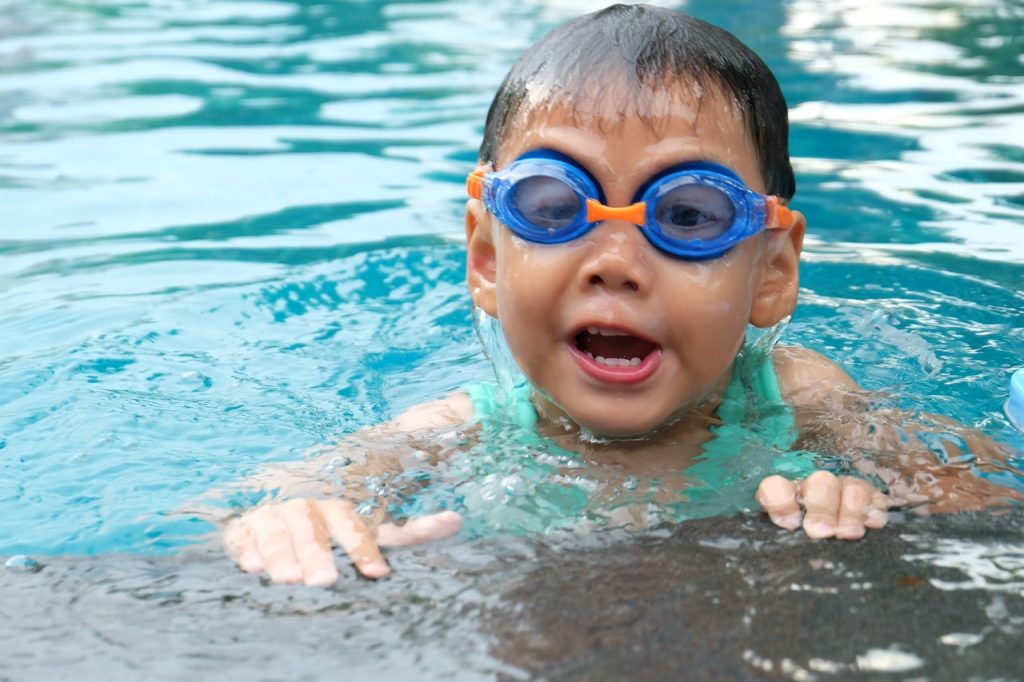Few things are worse than having swimming fun cut short by rashes, dry skin, severe itching, and allergic reactions. The harsh chlorine in the pool and the natural composition of seawater can have these effects on our child’s skin, even if they weren’t prone to sensitivities before.
Many kids don’t notice these symptoms because they’re having so much fun in the pool or sea, so it’s often the parents that notice them, and usually when it’s too late. Swimming in pools with good CO2 pH control systems provides significant prevention of symptoms, but this is not always possible, so what do you do?
Here are the best ways on how to protect your child’s sensitive skin while swimming in the pool or sea:
Moisturize from top to bottom
Moisturizing the skin and hair before and after a swimming session is the best way to prevent chlorine or saltwater from drying it out. In the days leading up to the swimming day, rub lotion on your child’s skin and condition their hair to lock moisture in. This is especially important if your child is prone to skin sensitivities like dryness or rashes. Even if they aren’t, it’s a lot healthier for their skin to be moisturized before going swimming.
On the day itself, put conditioner in their hair in the morning, but don’t rinse it out. Doing this helps prevent the chlorine or saltwater from being absorbed into the hair strands.
Have them wear a rash guard
A rash guard limits the amount of your child’s skin that is exposed to the water and the sun. There are a lot of chemicals in pool water that can irritate your child’s skin, and swimming outdoors exposes your child to lots of UV rays. Protect their skin as much as possible by having them wear a rash guard or rash vest.
Aside from limiting the exposure to water and UV rays, a rash guard also helps prevent scrapes and chafing, which are common occurrences for kids playing in the pool or at the beach.
Shower before and after
Getting their hair and skin wet before swimming provides an extra layer of protection against irritants in the water. If they haven’t showered before arriving at the pool or beach, have them take a full shower and give them another rinse at the pool or beach area.
After swimming, have your child rinse off as soon as possible to get rid of the irritants and prevent their skin from drying out. Once you have access to a proper bathroom, get them showered right away to wash off bacteria and contaminants from the water. Use conditioner and moisturizing body wash to rehydrate their skin and hair as much as possible.
Re-moisturize their body with baby lotion or argan oil after drying off. Make sure to only use items that are tried and tested for your child’s sensitive skin.

Give them a lot of water
Adequate hydration is one of the keys to keeping hair and skin healthy. Have your child drink plenty of water while swimming and after swimming to replenish the water they lose through sweating. Call them out of the pool to have at least a few sips of water throughout the swimming session. Avoid giving them soda or other sugary or caffeinated beverages; these drinks have a diuretic effect that can make your child lose water faster through urination.
Apart from its benefits on skin and hair, water is great for preventing swim cramps and overheating while swimming. Always bring a large container of water with you whenever your family goes to the pool or beach.
Limit swimming time
This is often easier said than done but it’s necessary to protect your child from severe skin reactions from the pool or saltwater. Before going swimming, tell your child how much time they can have in the pool. If they can take multiple dips, let them know how many minutes they can go at a time. Allow them to negotiate (within reason). It’s the best way to avoid tantrums when it’s time to get them out of the water.
If your child has asthma or allergies, consult their pediatrician about how much time they can spend in the water without risking their health. They may also give you recommendations on medications or creams to use if your child experiences symptoms despite your prevention efforts.
Skin sensitivities shouldn’t stop your child from enjoying a day in the pool or at the beach. With proper precautions and proactive measures, you can let your child enjoy the day without worrying every minute about an unexpected rash or severely dried-out skin afterward.

